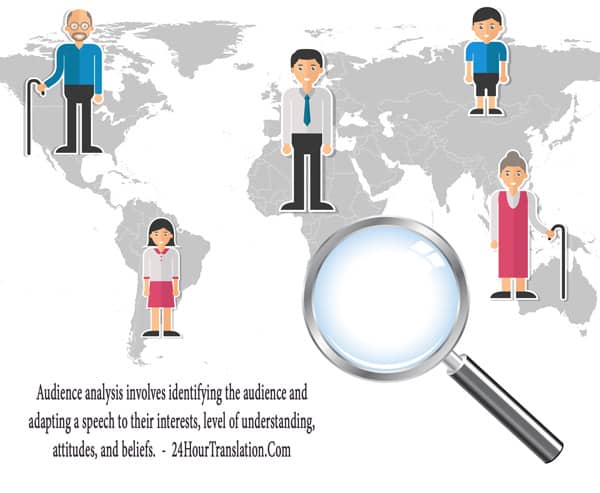From our experiences in work and life, we know people differ in many ways. In a diverse environment, every day we must negotiate differences in culture, age, ethnicity, gender, religion, health, sexual orientation, socio-economic status and language, to name a few. Each one of these differences influences personal values that we need to recognize. The following contains common social identifiers intrinsic to diversity.
Social identifiers:
[table id=4 /]
In international business, we understand that these social identifiers influence the values, motivations, attitudes and beliefs of fellow workers and potential customers. They also influence how individuals translate and respond to our messages. One consequence of diversity is that different people respond to our messages in different ways, sometimes in very unanticipated and surprising ways.
 Profiling Message Recipients
Profiling Message Recipients
Because of these differences, when we begin to plan a message, we need to consider how our reader will respond. Unless we are sending a relatively unimportant message, we should craft personalized letters that are geared toward what we know about the individual. The first step in doing this is to profile the intended recipient, based on what we know. The nature and importance of the situation will dictate how comprehensive our profile should be. Even when we think we don’t know enough about other persons to profile them, we should try answering these questions.
1. What is the age of the recipient?
2. Is the recipient male or female?
3. What are the recipient’s academic credentials and knowledge level?
4. What language(s) does the recipient speak and know?
5. What are the recipient’s ethnic connections?
6. What is the recipient’s social and economic position?
7. What does the recipient value and believe?
8. What is the recipient’s degree of authority?
Not every message warrants a comprehensive analysis of the recipient. In fact, we may need to answer only one or two questions to write an effective message. Even when the objective of the message is an extremely important one, only a few factors matter. The idea here is that we are more likely to succeed when we understand the needs, wants and beliefs of our recipient than when we don’t. A comprehensive analysis is particularly important when we are communicating in foreign languages and providing professional translations for diverse cultures. By completing an analysis, we can position ourselves strategically to know how to ask for what we want and how to persuade the recipient to embrace our goals.


 Profiling Message Recipients
Profiling Message Recipients